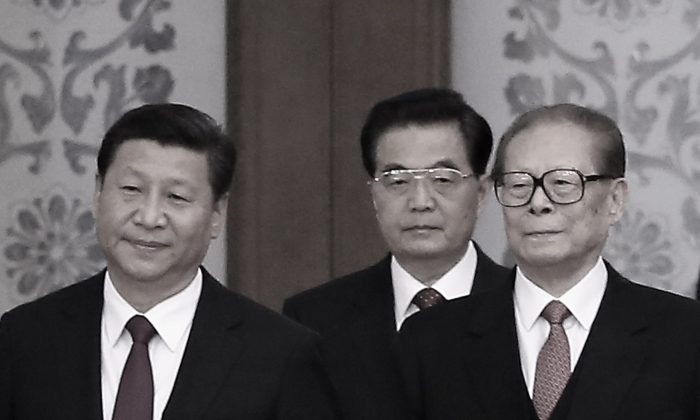French Privacy Watchdog Opens Preliminary Investigation Into TikTok
Commentary
The seven top leaders of the Chinese Communist Party (CCP) have not appeared in Chinese media since the beginning of August. This could suggest the annual secretive Beidaihe conclave—when the CCP leadership gathers with no announcements, no press releases, and no public contact—is taking place at the seaside resort not far from Beijing.
With various disasters and conflicts in 2020 posing major difficulties for the regime, such as the trade talks and the CCP virus (aka novel coronavirus) outbreak, the secret retreat in Beidaihe for the Party comrades surely merits attention.
The Absence of the Seven Politburo Standing Committee Members
Since Aug. 1, none of the seven Politburo standing committee members have made any public appearances on state-run broadcaster CCTV.
Although Party General Secretary Xi Jinping was reported to have sent a message of condolence to Lebanese President Michel Aoun on Aug. 5 over explosions in the country’s capital, Beirut, he did not make a public appearance.
One of the signs suggesting an annual conclave of leaders is underway would be that experts in science, medicine, and technology would be invited to Beidaihe for summer vacation for a day or two by current and retired senior cadres before the meeting.
Take the 2003 Beidaihe retreat as an example. Then-vice chair Zeng Qinghong greeted Chinese experts and scientists in Beidaihe to discuss the SARS (severe acute respiratory syndrome) epidemic.
This year, with the raging pandemic, it is yet unknown whether the Party will invite experts to the seaside resort.
This Year’s Agenda
This closed-door meeting in Beidaihe will likely discuss the numerous challenges, domestic disasters, and international tensions that are yet to be resolved. The Sino-U.S. relationship has deteriorated to its lowest point, as evidenced by the closures of consulates, along with the series of punitive measures against Chinese officials and companies by the Trump administration.
Of course, the Party is not innocent in this diplomatic chain reaction. The CCP has initiated numerous attacks to intensify international tensions. The provocative military activities in the Taiwan Strait, South China Sea, and the East China Sea; the border conflict with India and the subsequent decline in relations with neighboring countries; and abandoning the Sino-British Joint Declaration to push forward a national security law in Hong Kong—all have triggered sanctions from countries in the free world.
Domestically, the Party is saddled with problems: floods in the south; drought in the north; epidemics of various infectious diseases throughout China; voices against the regime from social elites—such as Ren Zhiqiang, real estate tycoon and an outspoken descendant of former Party officials (known as a “princeling”), and Xu Zhangrun, a professor at Tsinghua University; the deteriorating economy; and even the surfacing of infighting among Party factions.
A typical telltale case would be that of the conglomerate Tomorrow Group, which responded on July 18 to Beijing’s announcement of takeovers of nine of its subsidiaries with an online version of a “solemn statement.” Founded by Xiao Jianhua in 1999, within 20 years the firm spanned multiple fields such as finance, industry, real estate, communication services, energy, and the internet. Xiao is alleged to be a “big white glove” (money launderer) for high-ranking officials, and was reportedly being investigated for his close ties to an official known for his loyalty to former Party leader Jiang Zemin.
Another example is widely circulated footage showing the opening of the Beidou 3 satellite navigation system on July 31, when vice premier Liu He, a close ally of Xi who was the ceremony’s emcee, publicly humiliated premier Li Keqiang. Aired on state-run CCTV, the footage showed that when Li was introduced at the ceremony, Liu left him no time to accept applause from the audience. Li was obviously embarrassed.
Rumors That Xi Has Been Asked to Step Down
Nikkei senior staff writer Katsuji Nakazawa speculated in a recent article that since the CCP faces many problems, Party elders would definitely want to talk to Xi during the Beidaihe conclave.
There are also Chinese reports floating around that say Xi’s opponents are trying to get him off the throne.
For instance, an open letter circulating online in March called for an expanded meeting of the Politburo to discuss “the issue,” that is, whether Xi should step down. The letter was shared to popular social media platform WeChat by Chen Ping, a prominent princeling.
Also, a tweet by hedge fund manager and frequent Beijing critic Kyle Bass went viral in April. According to his “sources within…the Guangdong elite (Uncle Deng’s family) are beginning to rattle the cages of change against the supposed ‘emperor for life,’” referring to former Party leader Deng Xiaoping and Xi.
So far, The Epoch Times has not been able to verify these claims.
In a recent speech, U.S. Secretary of State Mike Pompeo called on the free world to act together with the Chinese people, to propel real change in China. “Changing the CCP’s behavior cannot be the mission of the Chinese people alone. Free nations have to work to defend freedom,” he said. “If the free world doesn’t change… communist China will surely change us.”
It seems unlikely that Xi will be overthrown simply through one Beidaihe meeting. After all, Xi has developed his military power in the past eight years since he took the top Party position. To remove Xi won’t be as easy as how both former Party general secretaries Hu Yaobang and Zhao Ziyang were purged, since neither Hu nor Zhao held any real power in the military.
Nonetheless, it is reasonable to believe that a political power struggle is being staged at Beidaihe now.
Views expressed in this article are the opinions of the author and do not necessarily reflect the views of The Epoch Times.
Focus News: Power Struggle in China May Be Playing Out in Beidaihe Now
Kodak Shares Drop After Loan Paused Amid Insider Trading Allegations
